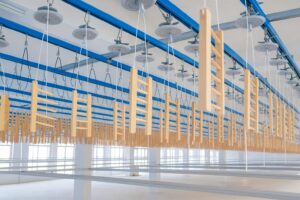What Are the Benefits of a Wooden Cash Register Toy for Children?
You want to find toys that teach important life lessons. But many electronic gadgets do the thinking for your child, limiting true learning and imaginative growth.
A wooden cash register toy provides powerful benefits by creating a fun, hands-on platform for children to develop early math, social, and fine motor skills through imaginative play.
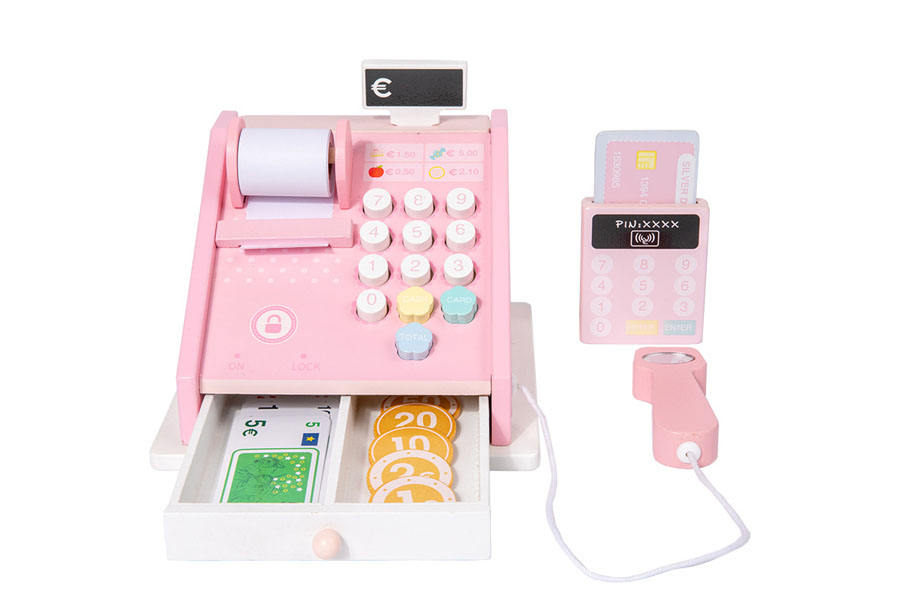
As a manufacturer, I’ve seen countless toy designs, but the wooden cash register is one I’m particularly passionate about. It seems so simple, yet it’s a powerhouse for development. When I talk with professional buyers like Sophia from Germany, we often discuss products that offer deep educational value. A wooden cash register isn’t just a prop for playing "store." It’s a tool that allows children to act out real-world scenarios, building their confidence and understanding of the world around them, one pretend transaction at a time.
How does pretend play with a cash register build real-world skills?
You hope your child can learn about how the world works through play. But it’s hard to find toys that copy real-life interactions in a meaningful way.
By mimicking the roles of shopkeeper and customer, children practice communication, negotiation, and basic transactions. This role-play directly builds confidence and understanding for real-world interactions.
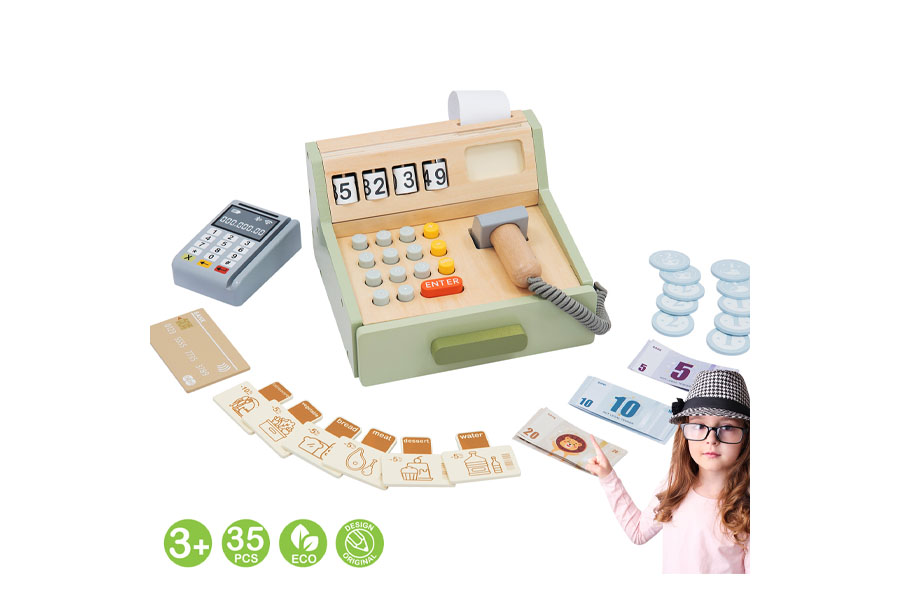
The beauty of a wooden cash register is that it creates a stage for practicing life. The toy becomes the center of a story that the children direct. This isn’t just random play; it’s a rehearsal for social situations. The pretend shop becomes a safe space to learn the unwritten rules of community and commerce. For example, a child learns the sequence of a conversation, from a polite greeting to a final "thank you." They learn to take turns, to listen to what the "customer" wants, and to work together to complete the sale. As we design these toys, we think about how they facilitate this interaction. The simple, open-ended design is intentional. It ensures the focus remains on the human connection, not on the toy itself.
| Role in Play | Real-World Skill Practiced |
|---|---|
| The Shopkeeper | Greeting customers, listening to requests, good manners. |
| The Customer | Asking for items, making choices, practicing patience. |
| The Transaction | Turn-taking, understanding exchange, responsibility. |
What developmental areas does a wooden register support (math, social, motor)?
You want to choose toys that offer well-rounded development. But so many products focus on just one skill, leaving other important areas behind.
A wooden cash register is a true multi-tool for development. It simultaneously supports math concepts, social skills through role-play, and fine motor dexterity with its interactive parts.
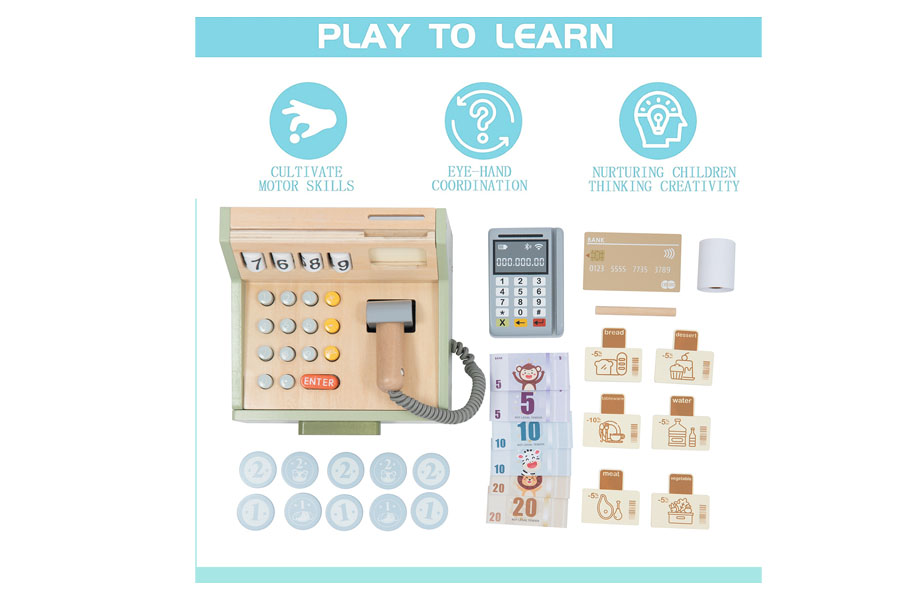
One of the greatest strengths of this toy is its ability to engage a child on multiple levels at once. The play is so fun and natural that the child doesn’t even realize they are learning. This combination of physical and mental exercise is incredibly efficient from a developmental standpoint. We carefully design each element to contribute to this holistic growth.
Early Math Skills
The cash register is a child’s first calculator. They start by simply recognizing numbers on the buttons. Then they move on to sorting the play money, counting out coins, and even doing simple addition when a customer buys more than one item.
Social and Emotional Growth
Playing "store" requires conversation. Children learn how to express their needs, listen to others, and cooperate to reach a goal. It’s a fantastic way to practice empathy and social etiquette.
Fine Motor Refinement
Pushing the chunky wooden buttons, turning a little crank, grasping the coins and bills, and sliding the cash drawer open and shut—all of these actions are a workout for small hands. They build dexterity, pincer grasp, and hand-eye coordination.
Are wooden cash registers better than plastic or electronic versions?
You see flashy plastic cash registers and wonder if they are a better choice. But their loud noises and limited functions might actually stifle your child’s creativity.
Yes, wooden cash registers are better because they are more durable, safer, and inspire open-ended imaginative play. A wooden toy lets the child create the world, not just react to it.
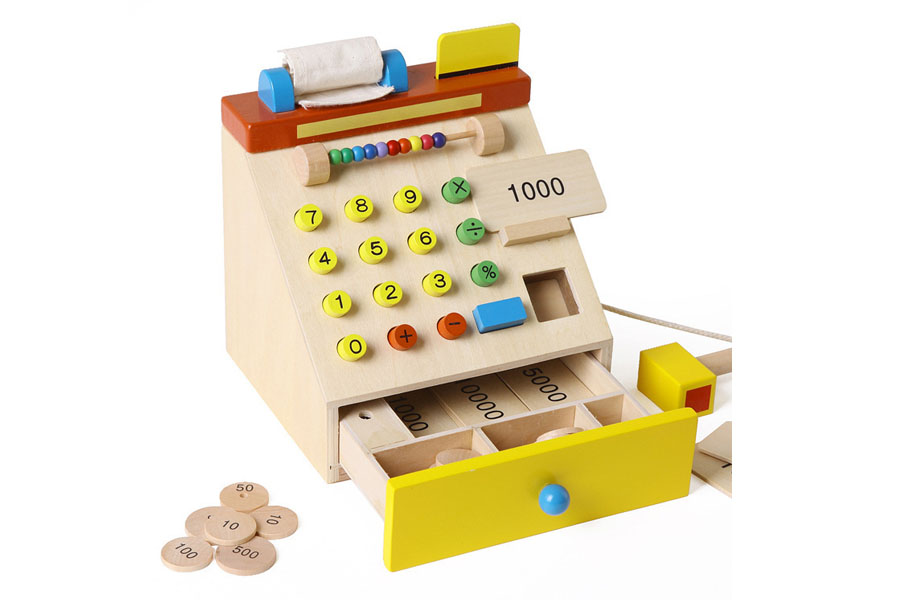
In my business, quality and play value are everything. The choice between wood and electronic plastic is clear. While an electronic toy might seem more "advanced," it often limits the very thing we want to encourage: imagination. The lack of beeps and flashing lights in a wooden toy is a feature, not a flaw. It creates quiet space for the child’s own thoughts and creative impulses to fill the void.
| Feature | Wooden Cash Register | Plastic/Electronic Register |
|---|---|---|
| Durability | Made from solid wood, it’s an heirloom toy built to last for years. | Often brittle, can crack easily, electronic parts can fail. |
| Safety | Finished with non-toxic, water-based paints. No small, breakable parts. | Can have sharp edges if broken, contains batteries and complex parts. |
| Play Value | Completely open-ended. The child provides the sounds and stories. | Prescribed play. The toy’s sounds and functions dictate the activity. |
| Sensory Feel | Warm, natural texture and a pleasant, gentle sound. | Cold, artificial feel with often loud and repetitive electronic sounds. |
| Sustainability | Made from a renewable, biodegradable material. | A petroleum-based product that contributes to landfill waste. |
How do cash register toys support early financial literacy?
You’d like to teach your child the basic concepts of money. But it’s an abstract idea that can be very hard for a young mind to understand.
Cash register toys make the concept of money tangible. Through play, children learn that money is exchanged for goods, that items have different values, and the basics of making change.
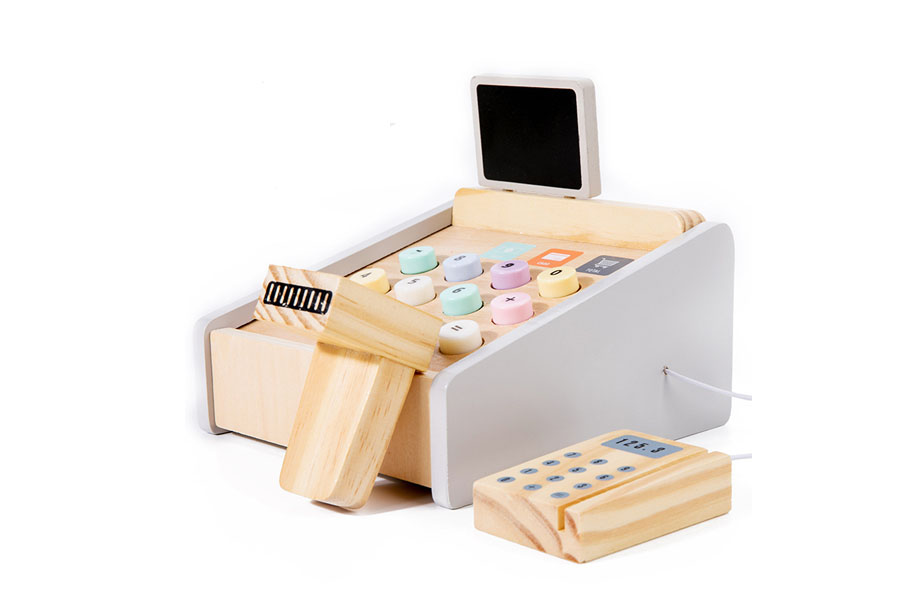
A toy cash register is the perfect first step toward financial literacy. It takes the abstract idea of money and makes it concrete. This hands-on experience is incredibly effective because it ties the concept directly to a fun, rewarding activity. The learning happens in a very natural, logical sequence. First, the child simply enjoys handling the different wooden coins and paper bills, sorting them into the drawer. Then, they begin to understand that to get a toy apple, they have to give the "shopkeeper" a coin. This establishes the fundamental principle of exchange. As they get older, they start to notice that bigger items might cost two coins instead of one. This introduces the idea of value. For more advanced play, they can even start practicing simple subtraction when they give change. This play-based learning builds a strong, practical foundation for understanding money.
Can these toys be used effectively in Montessori or Waldorf education?
You follow educational approaches like Montessori or Waldorf. You are always looking for toys that fit perfectly with their core principles of learning and development.
Yes, a wooden cash register is an ideal tool for both educational philosophies. It aligns perfectly with Montessori’s focus on reality-based learning and Waldorf’s emphasis on natural, imaginative play.
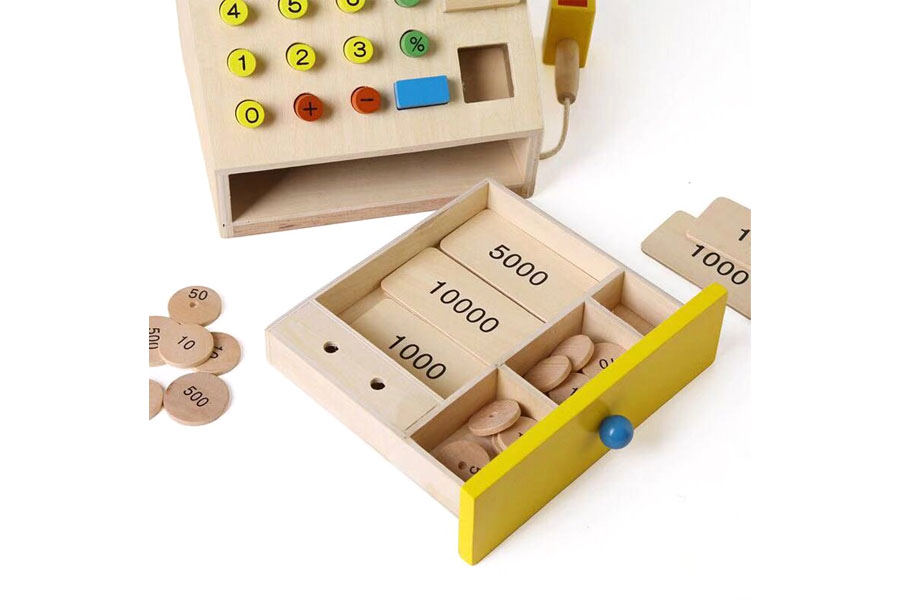
We often supply our wooden toys to educational settings because their design principles align so well with modern teaching methods. The wooden cash register is a perfect example of this synergy.
- For the Montessori Classroom: This toy is a quintessential "Practical Life" activity. It allows a child to mimic a real-world task—shopping—which helps them understand their community and culture. It is made from natural materials, which is a core tenet. The activity is self-contained and allows for independent, focused work. A child can practice sorting money and making transactions on their own, learning through repetition and hands-on experience.
- For the Waldorf Approach: Waldorf education values toys that are simple, open-ended, and made from natural materials to nourish the child’s senses. A wooden cash register is a perfect prop for imaginative play. It doesn’t impose a story with electronic sounds; it invites the child to create their own. This allows the play to be driven by the child’s inner world, fostering creativity and rich storytelling.
Do kids engage longer with wooden registers in imaginative settings?
You want to find toys that hold your child’s attention for more than a few minutes. Many toys with a single function are quickly cast aside and forgotten.
Yes, absolutely. Because a wooden register is so versatile, it can be the center of countless imaginative scenarios, leading to longer, deeper, and more sustained periods of play.
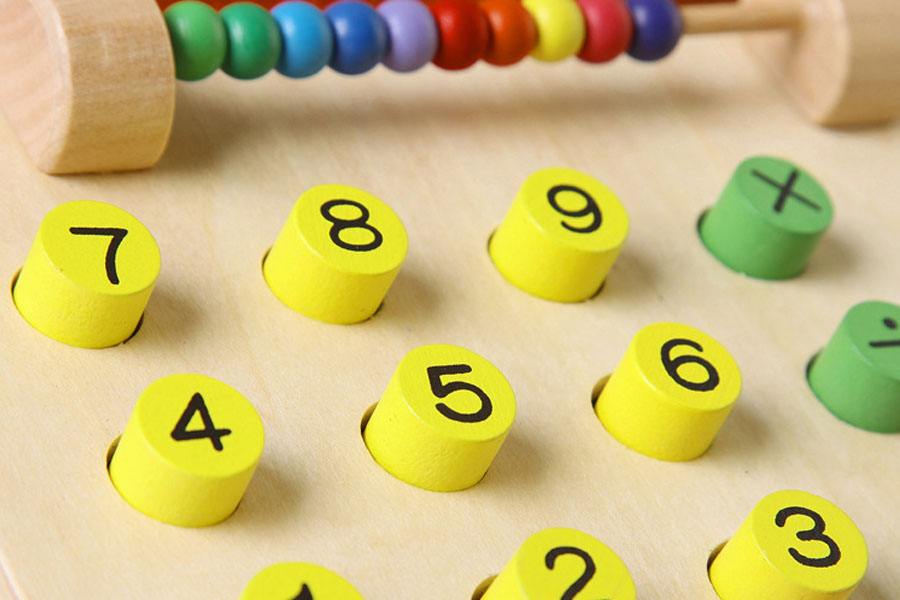
A wooden cash register’s true power is its adaptability. It isn’t just one toy; it’s the control panel for a hundred different worlds. This prevents play from becoming stale and repetitive. The toy’s function evolves with the child’s imagination. This is something we consider deeply in our design process. The simple, iconic form of a register can fit into almost any scenario a child can dream up.
- One day, it’s the checkout at a grocery store, selling play food.
- The next day, it’s the counter at a bakery, taking orders for imaginary cakes.
- Next week, it could be the ticket booth at a train station, the front desk at a library, or the register at a pet store.
Because its role is constantly being reinvented by the child, the toy remains fresh and relevant. This open-ended nature transforms it from a single-use object into a key piece of a larger play ecosystem, guaranteeing its place in the toy rotation for years.
Conclusion
A wooden cash register toy is more than just a checkout counter. It is a dynamic learning tool that builds essential math, social, and motor skills through pretend play.

